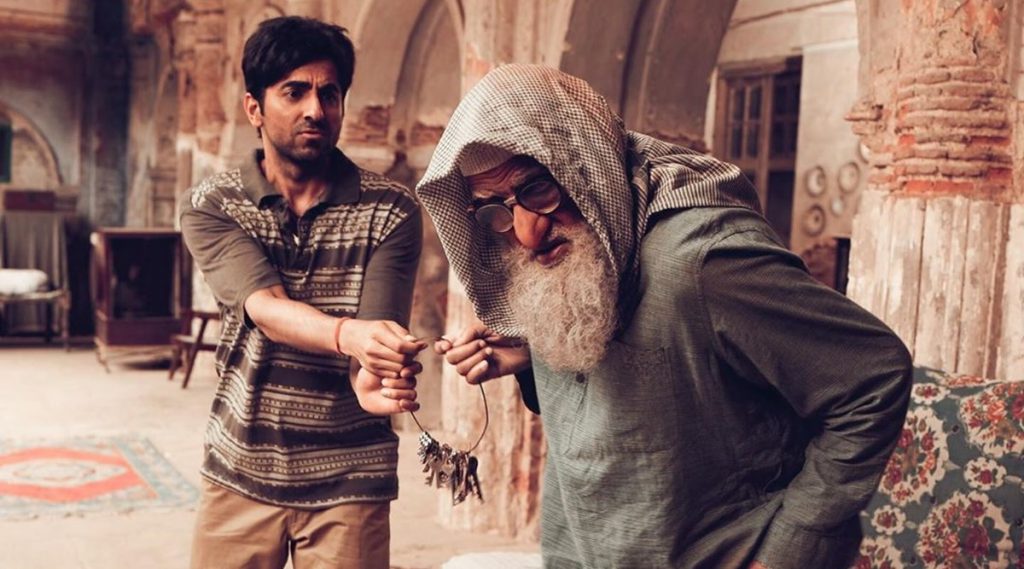Gulabo Sitabo marks the fifth time that writer Juhi Chaturvedi and director Shoojit Sircar have collaborated together. It is a partnership that began with Vicky Donor (2012) and flowered with Piku (2015) and October (2018). Gulabo Sitabo, sadly, is their weakest film. The first major Hindi film opting to have a direct release via an OTT platform (Prime Video) in the post-Covid world, Gulabo Sitabo does little to uplift the sense of gloom around. Perhaps it’s best for the film that it released this way amid a lot of publicity for being daring enough to bypass the theatres. This would, no doubt, help it grab considerable eyeballs, perhaps far more than a conventional theatrical release. For this film is not everyone’s cup of tea and would likely have struggled at the box-office.
Set in Lucknow, the film is a homecoming for Chaturvedi. It’s obvious she knows her roots well as she gets the little details, nuances and spoken language of all her characters bang on. But what is missing here is a cohesive, engaging story. The film often meanders into the realm of unbelievability and one misses the trademark spunk of the Chaturvedi-Sircar team. As a satire, the film has its odd, quirky moments, but these are sporadic. This is a pity because the film looks at an extremely pertinent conflict in old Lucknow. That of tenants versus landlords with the former occupying rooms in decaying old ancestral homes for years and years at meagre, next-to-nothing rents. The film also looks at how greed drives humanity to desperation and destruction.
The film’s title derives from a traditional glove puppet show from the state of Uttar Pradesh. As popularised by puppeteer Ram Niranjan Lal Srivastava, the two characters Gulabo and Sitabo mostly represent two women, the mistress and wife of the same man who are constantly bickering with each other. While Sitabo was the overworked wife, Gulabo was the commanding mistress. However, this metaphor (or is it just a reference?) doesn’t quite emerge convincingly in the film.
The centre of the film is an old, crumbling haveli, Fatima Mahal. Its ‘landlord’, the 78 year old Mirza (Amitabh Bachchan), a self-centred, grouchy and greedy miser, who is eagerly waiting for his wife of 95 years (Farrukh Jaffar), the owner of the mansion, to die so that he can drive out its tenants and claim the house for himself. One particularly troublesome tenant he wants out is Baankey Rastogi (Ayushmann Khurrana), a young man, who lives with his mother and three sisters and runs a failing wheat mill. Baankey, however, will have none of it and his conflict with Mirza forms a major part of the film. Things become further messy as the Government Archaeology Department, a goonda builder and a crooked lawyer all enter the equation, each aiming to exploit the decrepit house to suit their own agenda.
While Mirza is well-fleshed out, he is betrayed by a shallow sense of purpose and insufficient meat in the story. Still, hats off to Amitabh Bachchan for nailing Mirza’s character. The heart of old Lucknow is filled with innumerable grumpy such Mirzas and he is spot on. Though one has to say, his hunchback and prosthetic nose are overdone and the character looks far older than his 78 years. Baankey, on the other hand, has neither the characterization nor the story going for him. In that sense, Ayushmann Khurrana has nothing of substance to do in the film. Even his conflict scenes with Bachchan are insipid to the say the least. A note about his character though. He is a Rastogi. The Rastogis are the Jews of Lucknow, who, even if illiterate, stand out for their business acumen and crass taste. Baankey is simply lack-lustre here. There is no harm in breaking community stereotypes but then one needs a context to do that and it is missing in the film. Vijay Raaz as the Government officer from the Archeology Department and Brijendra Kala as the twisted lawyer, both fine actors, are expectedly more than competent in their performances.
However, the standout performance in the film comes from Srishti Shrivastava, playing Baankey’s sister, Guddo. She is spunky, gutsy, unabashed about being sexually promiscuous and crystal clear about what she wants in life and what she has to do for it. It also helps her that it is perhaps the best written character in the film. In fact, the writing is far better around the women characters, who have minds of their own and give it back to the men with interest when they have to. Though I have to say, I found Jaffar’s character of the 95 year old Begum contradictory. For all the entertainment she adds to the film, her modernity seems misplaced in the milieu and generation she belongs to even if she was the black sheep of her family.
In terms of technicalities, Avik Mukherjee’s camerawork gives us a far too santinized and almost ad-like look at old Lucknow while one wonders why Shantanu Moitra would simply regurgitate the most popular song from 3 Idiots as a leitmotif in the film. The editing, too, fails to keep the narrative engrossing enough and the pacing of the film makes it a difficult watch.
While there are many things that Shoojit Sircar and Juhi Chaturvedi get right in terms of the atmosphere, mood, setting and characters in their story, its the story that ultimately proves to be their nemesis. Gulabo Sitabo is a far cry from their best work and especially so, when they have set such high standards for themselves in Vicky Donor, Piku and October.
Hindi, Comedy, Drama, Color


